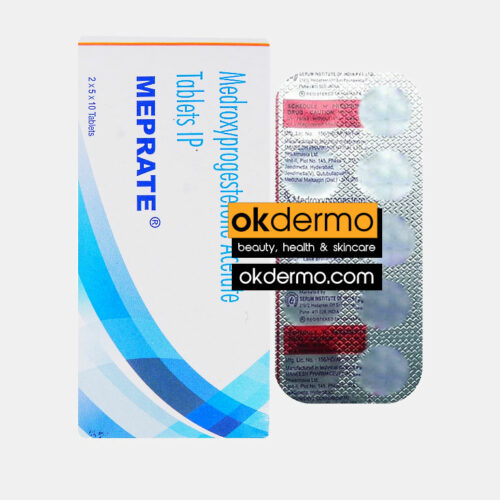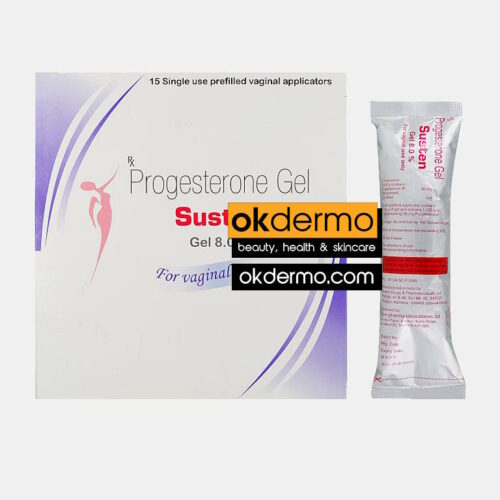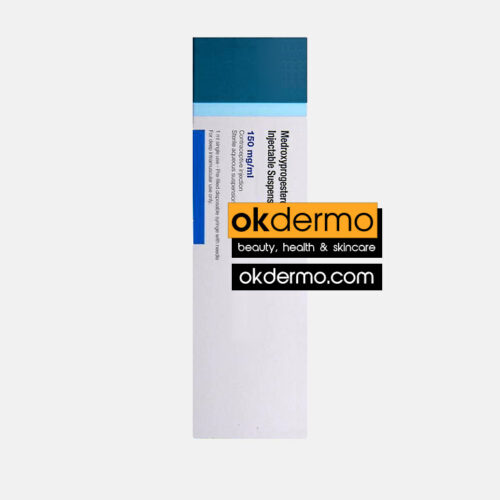Meprate Tablets: Uses, Side Effects and Considerations
Table of Contents
Meprate is a pharmaceutical tablet consisting of medroxyprogesterone acetate, a synthetic derivative of the female hormone progesterone. It is commonly prescribed for gynecological purposes.
Also, Meprate tablets are often utilized to treat irregular periods and manage conditions like endometriosis. The medication works by mimicking the effects of natural progesterone in the body. This helps in regulating the shedding of the uterine lining and stabilizing the menstrual cycle.
Meprate 10mg tablets uses
Meprate 10mg tablets are prescribed for various gynecological purposes. Some of the main uses include:
Menstrual Cycle Regulation:
Meprate helps regulate the menstrual cycle, especially in cases of irregular periods.
Treatment of Menstrual Disorders:
It is used to address conditions associated with abnormal menstrual bleeding.
Management of Endometriosis:
Meprate is also prescribed to manage symptoms of endometriosis, a condition where tissue similar to the lining of the uterus grows outside the uterus.
Preventing Uterine Hyperplasia:
It is also recommended to prevent endometrial hyperplasia in postmenopausal women. Hyperplasia is a condition in which thickening of the lining of the uterus occurs.
Meprate 10mg tablets for 5 Days Uses
The use and duration of Meprate 10mg for 5 days can vary based on your medical condition. The main uses include the treatment of abnormal or irregular menstrual bleeding. This medication is prescribed in a specific dosage and duration to help regulate the menstrual cycle.
A 5-day course of Meprate 10mg is commonly used to induce a withdrawal bleed, mimicking a menstrual period. This is often done as part of the management of various menstrual disorders, such as irregular periods or abnormal uterine bleeding. Stopping the medication after some time may lead to a normal menstrual cycle. To get the greatest results, follow your doctor’s directions.
Meprate Tablet Uses for Periods
Meprate tablet is used to treat periods by regulating the hormonal changes that can disrupt the normal pattern of menstruation. This can be particularly helpful for women experiencing irregularities due to hormonal imbalances.
Additionally, Meprate is used in the treatment of amenorrhea. The synthetic progesterone in Meprate plays an important role in initiating and maintaining the menstrual cycle. As a result, it ensures that the uterus undergoes the necessary changes.
Meprate Tablet Uses in Pregnancy
Meprate tablets are generally not recommended during pregnancy. Medroxyprogesterone is a synthetic form of the hormone progesterone, and its use in pregnancy is usually avoided due to potential risks.
Progesterone is naturally produced in the body and plays an important role in supporting pregnancy by maintaining the uterine lining and preventing contractions that could lead to miscarriage. However, the synthetic nature of medroxyprogesterone may have different effects, and its safety during pregnancy is not well-established.
If you are pregnant or planning to become pregnant, it is crucial to consult with your doctor before taking any medication, including Meprate. They will assess the potential risks and benefits based on your circumstances and medical history. Self-medication during pregnancy can pose serious risks to both the mother and the developing fetus.
Meprate Tablet Side Effects
Changes in Menstrual Flow:
Meprate may cause changes in menstrual bleeding, including changes in flow or duration.
Breast Tenderness:
Some women may experience tenderness or discomfort in the breasts while using Meprate.
Headache:
Headaches can be a common side effect associated with the use of Meprate tablets.
Bloating:
Bloating is another potential side effect.
Allergic Reactions:
In some cases, Meprate can lead to allergic reactions, presenting as skin rash, itching, or swelling.
Mood Changes:
Changes in mood, such as depression or mood swings, have been reported in some individuals using Meprate.
Blood Pressure Changes:
Meprate can impact blood pressure.
Meprate 10mg Side Effects
Meprate 10mg can have side effects that include nausea, headache, changes in menstrual flow, breast tenderness, and mood changes. Serious side effects are rare but can include blood clots or severe abdominal pain. It’s necessary to discuss any concerns or potential side effects with your doctor for personalized guidance.
-

Susten® Progesterone Vaginal / Oral / Rectal
Micronized Natural Progesterone 100mg / 200mg / 300mg / 400mg
Brand name: Prometrium, Cyclogest, Crinone, Endometrin, Progelle
Size: 30 Capsules / Tablets
From USD $44.00 Select options -

Meprate® Medroxyprogesterone Tablets
Medroxyprogesterone Acetate 10mg
Size: 30 Tablets
Brand name: Alti-Mpa, Provera, DepoProvera, MPA, Amen, Depo-SubQ Provera 104
USD $18.00 Add to cart -

Susten® Progesterone Vaginal Gel
Progesterone 8% Pre-Filled Applicators
Brand name: Crinone
Size: 10 Applicators 1.35g each
USD $58.00 Add to cart -

Medroxyprogesterone Acetate Injection
Medroxyprogesterone Acetate 150mg/ml
Size: 1ml Injection Vial
USD $38.00 Add to cart
Is Meprate Harmful for Pregnancy
Meprate is generally considered safe for use during pregnancy when prescribed by a healthcare professional. It is often used to support pregnancy or manage certain gynecological conditions.
However, it’s important to inform your doctor if you are pregnant or planning to become pregnant. They will assess your situation, weighing the potential benefits against any potential risks associated with the medication.
Frequently Asked Questions (FAQs)
-
For what purpose Meprate tablet is used?
Meprate tablets serve various gynecological purposes. Primarily it is used to treat irregular menstrual cycles. It is also utilized to manage abnormal uterine bleeding, providing relief from heavy or prolonged menstruation. Additionally, Meprate is employed to induce menstrual cycles in cases of amenorrhea.
-
When do periods come after taking Meprate Tablets?
The timing of menstrual periods after taking Meprate tablets can vary depending on the specific reason for prescribing the medication and individual response. In some cases, periods may occur a few days after completing the Meprate course. If you have completed the Meprate course and eight days have passed without experiencing periods, it is advisable to consult with your gynecologist.
-
Is it safe to use Meprate?
Meprate is generally considered safe when used as prescribed by a doctor. It is commonly used to manage various gynecological conditions. However, like any medication, Meprate may have potential side effects, and its use should be guided by a healthcare provider based on your health profile.
-
How to use a Meprate Tablet to delay periods?
Using Meprate to delay periods should only be done under the guidance and prescription of a doctor. Typically, to delay your menstrual period, your doctor may advise you to start taking Meprate a few days before your period date. Once you stop taking the medication, you may experience periods within a few days.
Conclusion
Meprate tablets containing medroxyprogesterone acetate play an important role in gynecological care, addressing issues such as irregular menstrual cycles, abnormal uterine bleeding, and endometriosis. The synthetic progesterone mimics natural hormonal effects, regulating menstrual patterns and promoting uterine health.
However, we recommend that during pregnancy healthcare professionals should strictly supervise its use. It is very important to know the side effects, like changes in menstrual flow and mood. So, Meprate proves to be a valuable tool in controlling women’s reproductive health that provides relief and stability when prescribed and used appropriately.
References:
- https://www.drugs.com/mtm/medroxyprogesterone.html
- https://journals.lww.com/greenjournal/Fulltext/2013/07000/Practice_Bulletin_No__128___Diagnosis_of_Abnormal.33.aspx
Post by:
Dr.Marcella Jiovanni
Health and Beauty Expert
“Marcella Jiovanni actively promotes the importance of maintaining healthy skin, she envisions the future of dermatology as moving away from pure medical, pharmacological dermatology and flowing more toward a holistic approach to wellness and skincare.”

















